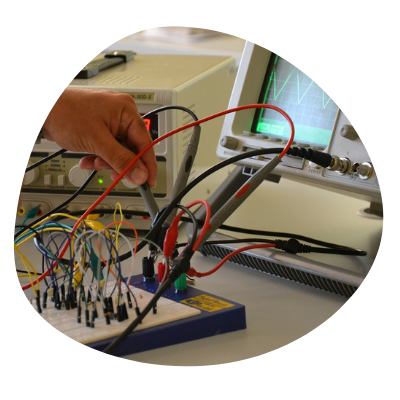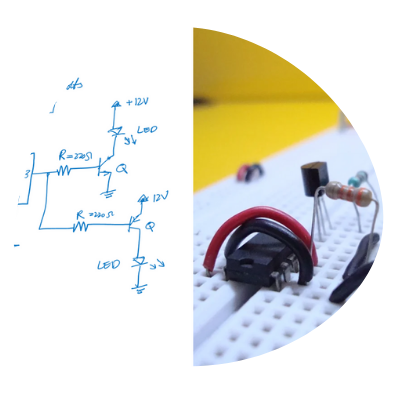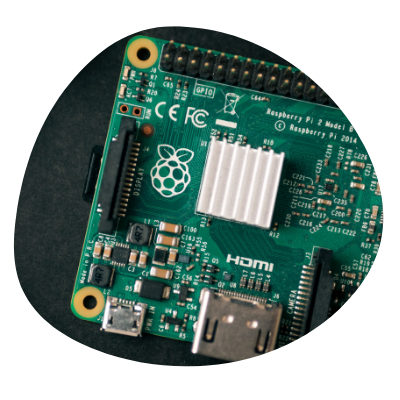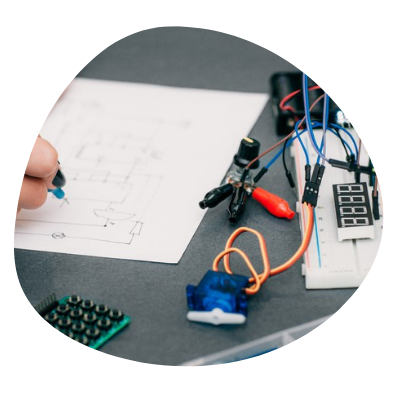Step by step course for complete beginners to learn electronics basics. Easily, start learning electronics & be a valuable professional in this digital electronics age
- You may be thinking electronics is too hard to understand
- You don't know from where to start? Nobody has given you a plan
- There is information overload, don't know what to study
- What you have tried so far isn't working
- No teacher office hours to help you in person - this is actually a big one
- Too much complicated math & hours of theory
- No practice or lab work i.e. no hands-on-experience
- No end project/skill oriented courses
Above problems are probably the factors why 70% of students don’t complete online courses.
And you know, among the above different factors, the main factors why students don’t follow & complete the course are – no dedicated office hours to answer students questions on regular basis & too many lengthy courses with hours of lectures.
The only step by step course that is designed to teach you electronics basics while developing your circuit prototyping skill.

The materials are presented in a simple possible way, so a complete beginner can understand them without any problems.
I was myself a beginner one time, I know exactly how & why little details matter when you are just starting out a new subject.
This course has a practical end goal, i.e. learning circuit prototyping on a breadboard.
Students not only learn electronics basics. But in the end, they have a ready-to-go skill to start a freelance career or have just fun with electronics.

Circuit Prototyping is when you make an actual circuit on a piece of a tool called the breadboard. Let’s say you have an idea to create beautiful flashing lights. You design a circuit for this project. To test & verify your circuit design, we need to create a prototype for it. And this is what circuit prototyping is all about.

I think, lab work is very important when you are a beginner.
Because in Lab work you actually learn a lot. For example, you learn how to use multimeter, do some measurements, how to make circuits.
So, keeping the importance of lab work in mind, I have decided to include bunch of lab work in this course.
I personally don’t like lengthy lectures.
According to data, students can’t stay in focus for more than 15 mins. So, in this course all the lectures will be under 5-12 min maximum.
But they will be packed with full useful information & ready to take action materials.


I think when you learn a concept and apply it to a real-time situation, the learning experience becomes magical.
Right!
So, every concept I will teach in this course will be related to a real-time application. I don’t want my students to limit their learning to just book-level understanding.
This is a very important question to answer. Because in my opinion, if you don’t understand in which situation you need to use certain electronic components, you will not be able to design your own electronic circuits.
So, in every lecture about basic electronics components, we will certainly focus on answering this particular answer.


I am a huge fan of creative activities. In this course, we will be doing activities that will make you think outside the box.
Don’t worry, they will be beginner-friendly. But they will not be that easy too.
In my own experience, when you are starting with a new subject, as a beginner you have a lot of questions and confusion.
The problem is not getting the answer, the problem is how to get the answers. Like when I was a beginner, I don’t know what to type in google to have the answer. It was not like I didn’t find the answers, but after a lot of struggles and searching for this and that.
So, this course has 60 days coaching program, you just email me your problem in whatever broken words. I am sure I will exactly understand what are you looking for and will answer it for you.
Now, if the answer needs a detailed discussion, then I will see you on Google Meet and leave the meeting until you say you got the answer.

You will learn all the fundamental concepts of electronics & will exactly know how to apply those concepts to make useful circuit prototypes.
Introduction to electronics: In this module, we will start our introduction to electronics. We will truly discover what is electronics.
What do we mean by electronics components, circuits, schematics, circuit prototyping, and much more.
We will have a look at the design stages of electronics products, circuits & systems – and will get to know why circuit prototyping is a very important skill to learn.
And at last, we will a look at a road map of a complete beginner guy in the field of electronics.
So, Module 1 is all about getting ourselves familiar with electronics and various electronics concepts necessary for developing circuit prototyping skills.
Fundamental electronics terms to understand: In this module, we will start with our first step of developing circuit prototyping skill.
We will start our discussion from a very basic concept, i.e. electric charge.
Based on the concept of charge, we will talk about electricity, current, voltage, and resistance.
Although there will be small mathematics involved, I will make it super easy for you guys.
When we talk about electronics, we cannot skip mathematics. Because we need mathematics to design electronics circuits.
The problem is not mathematics, the problem is people make it hard to understand.
After getting to know voltage & current, we will start to know what is AC & DC.
We will have fun playing with voltages and current, and guess what we will have power and ohm’s law as the results.
You know, Ohm’s law is the very basic law in electronics, and it is very simple. You just multiply current and resistance and make them equal to voltage. This simple equation is called Ohm’s Law.
So, Module 2 is all about basic terms we use all the time in electronics. I call them the ABC of electronics.
Important electronics components: In this module, we will start with the second step toward circuit prototyping while learning about electronics basics.
You know, an electronics circuit is nothing but a combination of properly connected electronics components.
So, this module will cover all important electronics components.
We will talk about Active & passive electronics components.
We will get to know the difference between through-hole and SMD components.
Then we will look at our very first electronics component, i.e. resistor. I will not just introduce you to resistors.
But I will try to teach you why and where we use resistors when it comes to circuit design and prototyping on breadboard.
We will then talk about capacitors, diodes, transistors, and finally integrated circuits (ICs).
We will not just talk about these electronics components, but will deeply study why and where we need to use them properly in our electronics projects.
So, Module 3 is all about fundamental electronics components. In this module, we will see physically what each component looks like and have fun learning.
Electronics circuit terms & important concepts: In previous modules, we learn about basics terms and basic components.
Now, it is time to use those concepts and connect the electronics components together properly and make useful electronics circuits.
So, in module 4 we will learn all about electronics circuit terms and important concepts.
We will learn what are nodes and branches of circuits. What is an open circuit and what are short circuits.
We will learn about parallel and series circuits.
The main difference in my teaching will be that I am not only interested in a concept, but I am truly interested in where and in which situation I need to use a concept.
If I talk about parallel circuits, the next thing you will see is me talking about where we should use parallel circuits in real-time projects.
So, in every module, I will try to teach you how to apply a concept in real-time projects and circuits so that you can be a professional everyone loves to work with.
In short, Module 4 is our third step to circuit prototyping, where we will learn about the most important circuit terms & concepts that you will see all over the place in the electronics field.
Electronics tools & measurements – Lab Work: In the previous modules, we learn about electronics terms, components, and circuits.
Now, to actually make physical circuits, we need some tools & devices.
To properly measure the values of components, voltage, and current, we need measuring tools as well.
So, in this module, we learn all about those tools that will help us make circuit prototypes.
We will learn how to use these tools properly in proper lab work.
We will conduct proper labs so that you have hands-on experience and learn how to use those tools & devices while working on your own electronics projects in the future.
Ready to make your first circuit prototype project: In the above modules we were preparing ourselves for this stage, i.e. to be able to make our own electronics circuit on breadboard i.e. prototype.
I mean, what is the point of learning electronics if we can’t make an electronics circuit or system?
So, in this module, we will be working on making our own circuit prototype from scratch.
We will learn about the different steps of circuit prototype making.
In short, we will have a lot of fun in this module. You will see how the basic terms you learn above are going to help you here.
You will see how the measuring tools we learned in the previous modules are going to help you to create circuit prototypes in real-time.
At the end of this module, you will be able to apply electronics basics concepts to create useful circuit prototypes that will solve real-time problems.
- What is electronics – let understand it in great details
- Electronics components
- Electronics circuits & schematics
- Different stages of designing a complete electronics system or circuit (no matter if it’s beginner level project or industrial level)
- Why circuit prototyping is an important skill to learn?
- Easy & precise Roadmap to learn electronics basics
- First step to circuit prototyping
- Electric charge (Columb, C)
- The concept of electricity
- Everything about current (Ampere, A)
- Oh no! Understanding the math of current
- The concept of voltage (Volts, V)
- Not again! Simple voltage mathematics
- Let’s make a peace with AC & DC for all time
- Relating voltage & current, introducing Ohm’s law
- Multiplying voltage and current, introducing power (Watt, W)
- Just kill me! Little mathematic of power
- Second step to circuit prototyping
- Active & passive components
- Through hole & SMDs components
- The concept of component ratings
- Resistor (Ohm)
- Why resistors are used in electronics circuits & systems
- Capacitors (Farad, F)
- Why we use capacitors in electronics circuits & systems
- Diodes
- Why diodes are used in electronics circuits & systems designs
- Everything to know about transistors
- Why transistors are all over the place in any electronics circuit
- Integrated circuits (ICs)
- Third step to circuit prototyping
- Nodes & branches
- Open circuit
- Short circuit
- Parallel circuit with examples
- Series circuit with examples
- Fourth step to circuit prototyping
- Power supply
- Multimeter
- Breadboard
- Lab Work 1 – how to use a breadboard
- Lab Work 2 -Learning how to measure resistance using multimeter
- Lab Work 3 – Voltage measurements
- Lab Work 4 – Current measurements
- Lab Work 5 – Continuity test
- Lab Work 6 – Diode testing & verification
- Lab Work 7 – Transistor pin configuration
- Lab Work 8 – ICs Reading & working

- Electronics Engineer
- Founder & CEO @ Yaman Electronics, Yelec (pvt) ltd
- Loves to teach & play badminton
Hi & Welcome Everyone!
I hope you are doing great & living life to its fullest. I am Abbas – your instructor for this amazing and exciting course, “Electronics Basics 101”.
I just wish there is a way that in a few lines I can totally explain myself and let you truly know me. Because as human or maybe this is just me, I really like to know a person well enough before I invest my time in that person. But as humans, what we can do our best is to try our best. And I will try my best here to give as much about myself as possible.
My love and passion for electronics begin from my childhood.
This is because my father was passionate about computers back then.
He got to know about computers when he was working in a factory where they work in hot temperatures while the guy who knew how to use a computer work under air conditioner (AC).
Later on, my father discovered that AC was not for him, but for the big computer sitting there. And this is how he became aware of computers.
Back then, computers were too expensive, and you got to know how to work with MS-DOS. My father was very excited about it and when computers became less expensive and Windows 95 were introduced. My father bought his first computer. I can’t remember the other specs, but it was manufactured by Compaq.
I was a child close to his father. Not only that, but I will be sitting there with him while he was doing something on the screen.
I never took interest in what was on the screen. I was interested in watching the green boards all over there inside the open CPU and the bunch of cool wire strips.
I ask dozens of questions about those things. What is this big green thing, my father answers, this is the motherboard of the computer. This board is doing everything I do on the screen.
I can’t possibly enlist all my childhood stories and questions and the moments I have with my father and the open CPU.
But let me share the one question that changed my life.
One normal day, my father was working on a computer, and I was looking at the CPU and asked my father who makes these boards. And he answered, “Electronics Engineers”.
That was the moment I decided that I want to become an electronics engineer.
And now I am writing this story with a smile on my face, some small tears in my eyes as well (because the journey was not that easy), and with a degree in electronics engineering from one of the prestigious institutes of my country.
With the blessing of GOD, I did it. Not just under graduation in electronics engineer, but Master’s as well.
Sorry for taking so much of your time, and thank you for reading it.
With the blessing of my parents and God, I have completed the following degrees.
- Master of Science (MS) in Electrical Engineering, Specialized in Radio Frequencies (RF) & Microwaves – National University of Sciences & Technology (NUST), Islamabad.
- B.Sc Electronics Engineering – University of Engineering & Technology (UET), Peshawar.
The simple answer is I love to teach and have a lot to share with the world.
You have 30-day Money-back guarantee
My main goal for this course is to teach & help you learn electronics basics. If this is not helping you, then I really don’t need your money. Your money is protected by a 30 day money-back guarantee.
Dear students, besides the amazing modules & benefits, this course has so much more to give you to enhance your resume. I try my best to give you as much value as possible.
Certificate
Earn a completion certificate which you can share this on LinkedIn and let the world know about your achievement.
Your Schedule
Learn whenever you feel like it. Watch every lecture anytime that best suits your own schedule. But please don't be too lazy.
Easy Language
Everything you will get in this course will be in simple, easy to understand English language.
100% Online
Access course materials on your mobile, laptops, or tablet as long as you have internet.
Lifetime Updates
Don't worry about future course & lectures updates. You will get all the updates for free lifetime.
60 Day Office Hours
I will answer your questions from Mon-Fri, 7-9 PM PST. So, make sure you come with a lot of questions.
You decide to enroll in this course. Your 60 days office hours will start on the day you enroll.
You start learning the lectures and labs. Everything is so simple and understandable. But somehow you get confused, or you get a lot of questions you need answers for.
Simply, you will email me at [email protected] and I will be there to help you.
Now, if your question(s) is simple, I will answer it in the email reply. But if I feel the answer can’t be justified in an email reply, then we will have a meeting on Google Meet for a detailed discussion.

Enrollment for pre-sale is going to close on 29th April 2022. So please hurry up because I will accept a batch of 60 students only.
The honest answer is, that I don’t want my course to be in that 70% category where students enroll in a course but don’t complete it.
The other reason is the 60 days of dedicated office hours for this course between 9-10 PM PST from Mon-Fri.
I think 60 days i.e. two months is enough time to complete this course. And I want to make myself available for every question from a serious student in these two months’ time.
So, I personally believe that it will not be practical to enroll 1000 students just for the sake of money and provide them with 60 days of office hours.
Above are the reasons why I will accept only 120 serious students for this course per batch.
Earn home page testamonial spot
As this is pre-sale, and you will be the very first batch to enroll. Your honest review of this course will help the future student a lot to make a clear decision. And I will put random students reviews on the homepage so that students can see and decide whether this course is best for them or not. Will you help me?
I sincerely thank all of you to make it this far. This means so much to me.
Now, if you have any further questions or anything, please contact me. I would love to answer that for you.
And if you think that this course is perfect for you, then please do join the course. I have so much to teach you.
If you have a passion & interest for electronics, then yes, this course is right for you.
Yes, I try to put together everything, keeping myself in the shoes of a complete beginner.
No, you don’t need any prior knowledge to understand the materials of this course.
All you need to be persistence.
If you don’t understand anything, ask questions. I will be there to help you.
Electronics is part of engineering. And there is no engineering without mathematics.
So to be very honest, this course does have math, but it is presented so simple that you will have no hard time understanding it.
I believe, math is not a problem. Because you as a human has infinite potential to learn anything.
The problem is, it is presented badly.
So, in this course, I try my level best to present math as simple as possible.
And don’t worry, there is not too much math in this course.
Yes, and you can share the certificate on LinkedIn as well.
I will be creating & releasing lectures for this course from 10 May as the enrollment closes.
You will have access to those lectures right away.
It will be like, I will be releasing the lectures continuously, and you will have access to watch them as they release.
All the lectures will complete in 2 months time.
I recommend to please follow the lectures as they release and be punctual & take full advantage of office hours.
If you do not like the course for any reason. Just contact us with in 30 days of purchase, and we will give you your money back without any question asked.
Yes, and I strongly recommend it for revisiting basic concepts if you are not a complete beginner.
I am sure you will also learn things that will be completely new for you.
Pre-Sale Enrollment for this course closes on 30 June, 10 PM PST.
If you put this decision off for a long time, you could miss out on this opportunity.
Keep in mind that the enrollment deadline isn’t some scarcity marketing tactic. I truly mean it.
And once the course registration closes, I don’t plan on opening it up again in the near future.
If I plan to add new features and bonuses, or modules to the course, the price of the course will go up accordingly.
But if you order now, you will get lifetime upgrades at no additional cost.
That way, when I add more materials or features to the course (which I will do), you get everything I add without having to pay one extra cent.
So, please don’t wait for anymore. Enroll now, and I see you in the course with a beautiful smile.
Secure payments
All payments are powered by Stripe - a world leading payment system.
30 day money-back guarantee
Didn't like the course. Take your money back without any question ask.
Thank you and best regards,
Abbas
Your best well wisher

